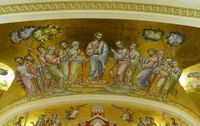On April 21, 2025, Orthodox Christians around the world continue to celebrate the joy of Easter, marking the first day of Bright Week, also known as Holy Monday. This festive week follows the Resurrection of Christ, celebrated on April 20, and is characterized by a series of joyous rituals and traditions that emphasize spiritual renewal and communal harmony.
Holy Monday, often referred to as Wet Monday, is a day filled with vibrant customs, particularly in Ukraine where the day is steeped in rich cultural significance. It is a time when people engage in the playful tradition of pouring water over one another, a practice believed to cleanse the soul and bring good health for the year ahead. The act of splashing water is not merely for fun; it symbolizes a deeper spiritual cleansing and renewal, reflecting the theme of resurrection and rebirth associated with Easter.
As the church calendar commemorates the holy martyr Januarius on this day, believers gather in churches to participate in solemn liturgies. The Royal Gates of the church remain open throughout the week, symbolizing the grace of God being showered upon the faithful. This year, the church celebrates the memory of St. Januarius, who was known for his devout faith during the harsh persecutions of Christians under Emperor Diocletian in the 3rd century. His martyrdom, along with that of his companions, serves as a poignant reminder of the sacrifices made for faith.
During Bright Week, the traditional fasting rules are relaxed, allowing the faithful to indulge in festive meals and communal gatherings. Many people visit churches, exchanging greetings of "Christ is Risen!" and the response "Indeed He is Risen!" This exchange fosters a sense of unity and joy among congregants as they celebrate the victory of life over death.
April 21 also coincides with World Creativity and Innovation Day, a day established by the United Nations in 2017 to promote awareness of the importance of creative thinking in solving global challenges. This dual celebration of spiritual and creative renewal highlights the significance of both faith and innovation in fostering a better world.
In addition to the religious observances, many people celebrate their name days on this date, particularly those named Januarius, Nifont, Ruf, and Susanna. Name days are often celebrated with as much fervor as birthdays in many cultures, adding another layer of joy to the day.
However, there are certain customs and taboos that are observed on Holy Monday. It is traditionally advised not to engage in negative behaviors such as quarrelling, drinking excessively, or engaging in heavy physical labor. Instead, individuals are encouraged to focus on spiritual reflection, charitable acts, and spending quality time with family and friends. The essence of the day is to cultivate joy and positivity, aligning with the overarching themes of Easter.
Folk traditions associated with April 21 also carry significant meaning. For instance, it is believed that the weather on this day can predict the summer's conditions. A sunny day is thought to herald a fruitful harvest, while rain may suggest a cooler spring. Various omens, such as the blooming of birch trees and the arrival of swallows, are observed closely, as they are said to reflect the upcoming season's climate.
As the day unfolds, families gather to share traditional Easter dishes, including pysanky (decorated eggs) and kulich (Easter bread), reinforcing bonds of kinship and community. The spirit of giving is also prevalent, with many engaging in charitable acts to help those in need, embodying the Christian principle of love and compassion.
In summary, April 21, 2025, is a day of rich traditions and deep spiritual significance for Orthodox Christians. It serves as a reminder of the enduring power of faith, community, and the joy of new beginnings. As believers pour water over one another in celebration, they are not only participating in a time-honored custom but also embracing the hope and renewal that Easter represents.







